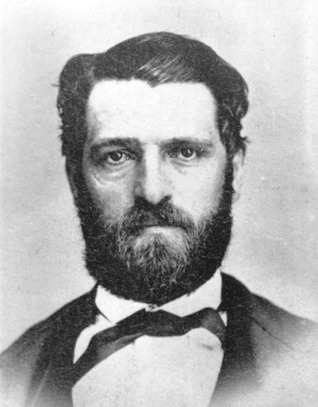Lucerne Besser
(1833 – 1905)
Chief - June 18, 1877 – October 29, 1879
(1833 – 1905)
Chief - June 18, 1877 – October 29, 1879
Born in Buffalo, New York, the son of a Swiss immigrant, Lucerne Besser came to Portland along the Oregon Trail in 1852. Settling in the young city Besser set up and operated several lumber mills. In 1867 he was elected to the City Council and dominated the powerful Street Improvement and Paving Committee for many years. Active in the Republican Party, Besser was one of the founding members of the “Holladay-Mitchell Ring,” also known as the Free Whiskey Ring. The powerful Republican organization that Besser belonged to evolved into the Republican “machine” that dominated Portland, and State, government until the early twentieth century. Politics was Besser’s main motivation and he worked tirelessly to gain control of the Metropolitan Police Department for the Republican Party. In 1874 the city gained control of the Board of Police Commissioners, members of which would now be appointed by the Mayor, and in 1877 Besser succeeded in having James Lappeus removed as chief of police, assuming the office himself.
Politics was the dominating force in Besser’s police department and many members of the original police force, all loyal Democrats, lost their jobs only to be replaced by Republicans loyal to Besser and his ring partners. Despite the claim by detective H.M. Hudson that he virtually ran the police force during Besser’s term as chief of police, Besser was a surprisingly hands-on chief. He personally led the search for the killer’s of Louis Joseph, a 14-year-old boy killed during a bold, daylight robbery at O’Shea’s Pawnshop in 1878. He also personally arrested Jackson Grant, a Modoc Indian accused of murder, and led the fight against burglaries in Portland. Regulation of the liquor industry was still a major concern for the Portland Police and Besser made many more arrests for liquor violations than Lappeus did, but he made little headway in reigning in the controversial business.
Besser’s term as Police Chief lasted only a little more than two years and then Lappeus was returned to office. Besser went back to the City Council and spent the rest of his career trying to regain leadership of the Street Improvement Committee. He also worked tirelessly to have Lappeus removed as chief. In 1883 he was successful at removing Lappeus, but his corrupt deal with Mayor James Chapman was exposed ruining his own career, as well as Chapman’s. Besser spent the rest of his life fighting charges of corruption in court and died in 1905, while residing at the Multnomah County Poor Farm near Troutdale.
Politics was the dominating force in Besser’s police department and many members of the original police force, all loyal Democrats, lost their jobs only to be replaced by Republicans loyal to Besser and his ring partners. Despite the claim by detective H.M. Hudson that he virtually ran the police force during Besser’s term as chief of police, Besser was a surprisingly hands-on chief. He personally led the search for the killer’s of Louis Joseph, a 14-year-old boy killed during a bold, daylight robbery at O’Shea’s Pawnshop in 1878. He also personally arrested Jackson Grant, a Modoc Indian accused of murder, and led the fight against burglaries in Portland. Regulation of the liquor industry was still a major concern for the Portland Police and Besser made many more arrests for liquor violations than Lappeus did, but he made little headway in reigning in the controversial business.
Besser’s term as Police Chief lasted only a little more than two years and then Lappeus was returned to office. Besser went back to the City Council and spent the rest of his career trying to regain leadership of the Street Improvement Committee. He also worked tirelessly to have Lappeus removed as chief. In 1883 he was successful at removing Lappeus, but his corrupt deal with Mayor James Chapman was exposed ruining his own career, as well as Chapman’s. Besser spent the rest of his life fighting charges of corruption in court and died in 1905, while residing at the Multnomah County Poor Farm near Troutdale.

